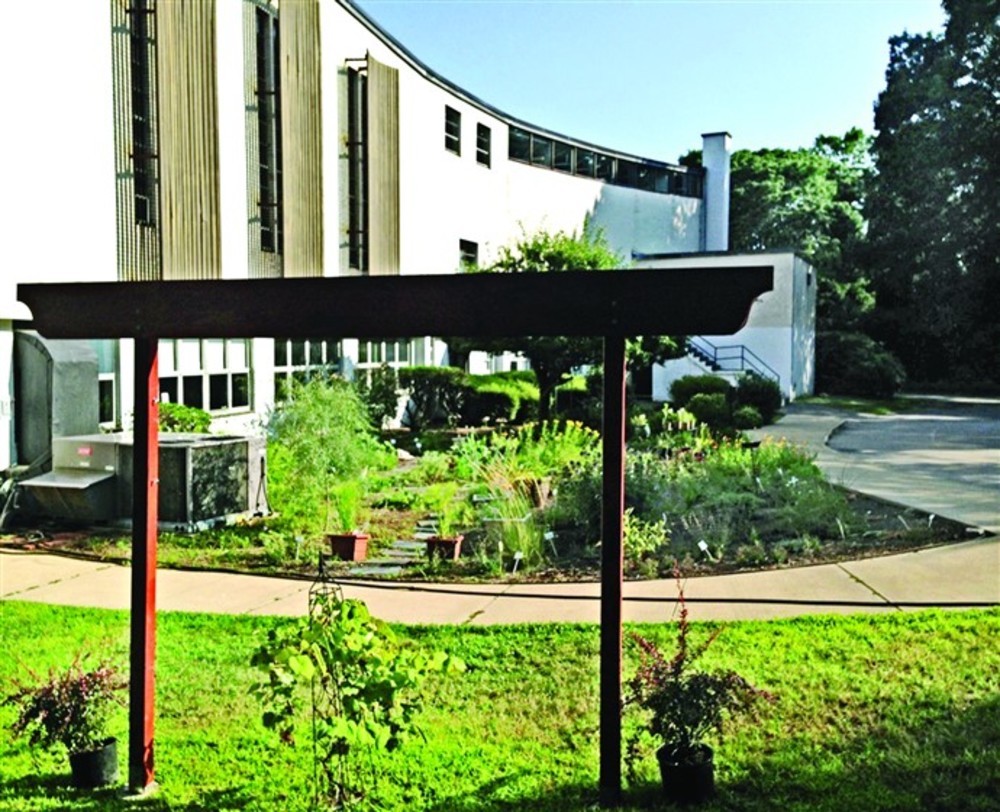Sweet bay has medicinal qualities
And by the river upon the bank thereof, on this side and on that side, shall grow every tree for food, whose leaf shall not wither, neither shall the fruit thereof fail; it shall bring forth new fruit every month … and the fruit thereof shall be for food, and the leaf thereof for healing. (Ezekiel 47:12)
 The arbor at Temple Sinai’s garden. /Catherine WaltersPlants played many roles in Biblical times, as they do today, for food, personal beauty, hygiene and ritual, and as aids to healing. Israeli botanical scholar Michael Zohary maintains that “Although healing by plants is not explicitly mentioned in the Bible, herbal remedies were numerous and specific. The ultimate healer was God, and prayer was therefore the remedy most often prescribed. Because mentioning medicinal uses of plants would defy the belief in God’s exclusive healing power, they were rarely mentioned in scripture.” And indigenous knowledge of medicinal attributes of herbs and their uses in healing belonged to the women.
The arbor at Temple Sinai’s garden. /Catherine WaltersPlants played many roles in Biblical times, as they do today, for food, personal beauty, hygiene and ritual, and as aids to healing. Israeli botanical scholar Michael Zohary maintains that “Although healing by plants is not explicitly mentioned in the Bible, herbal remedies were numerous and specific. The ultimate healer was God, and prayer was therefore the remedy most often prescribed. Because mentioning medicinal uses of plants would defy the belief in God’s exclusive healing power, they were rarely mentioned in scripture.” And indigenous knowledge of medicinal attributes of herbs and their uses in healing belonged to the women.
“Encyclopedia Judaica” notes that about 70 plants are mentioned in the Talmud as having medicinal properties, including olives, dates, pomegranates, quinces among fruit – garlic, beet, hyssop, cumin, and fennel-flower among vegetables and spices. In addition, wild plants are referenced as having remedial qualities. One such plant is the sweet bay or bay laurel (Laurus nobilis), a tall, conical evergreen tree that abounds on Mt. Carmel and in the stony soils around the Galilee. The leaves of the bay, when broken, emit a sweet scent and are used to flavor Mediterranean cuisine. In the ancient world, oil of bay was used externally in treating wounds and healing bruises and was also consumed in a tea for digestive ailments.
The Biblical Garden at Temple Sinai grows a potted specimen of bay laurel, and it spends the winter indoors. If you want your own evergreen supply for cooking, it is commonly available in any garden center in the spring, and is easily maintained in a sunny window. The fresh leaves are very mild and do not develop their full flavor until several weeks after picking and drying.
The Biblical Garden at Temple Sinai in Cranston grows more than 70 specimens of plants and trees that provide a living testament to our connection with Torah and to the everyday lives of our ancestors in ancient Israel. Soon, students of the Religious School at Temple Sinai will be growing foodstuffs that were staples of Israelite diet, including chickpeas, lentils and broad beans. When the soil is ready, they will sow wheat and barley, and plant annual herbs, tender vegetables and flowers.
CATHERINE WALTERS is a passionate gardener and a longtime member of Temple Sinai. Much of this article originally appeared in their Biblical Garden Blog and is reprinted with permission. Volunteer gardeners of all ages are welcome to participate in the garden, now entering its fifth season. Contact Walters (margalit_rut@hotmail.com) for more information.







